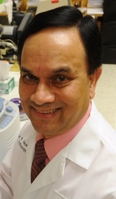
Fazlul Sarkar, Ph.D., professor of Pathology and Oncology, for the Wayne State University School of Medicine, has been appointed to the rank of Distinguished Professor by the university's Board of Governors.
"I am thrilled to receive this honor," said Dr. Sarkar, who has been with the School of Medicine more than 20 years.
Dr. Sarkar studies natural agents found in a variety of vegetables and a spice that can decrease tumor growth and greatly enhance the effectiveness of chemotherapy or radiation therapy treatments. The compounds so far examined by Dr. Sarkar -- found in soy, leafy vegetables, cruciferous vegetables like broccoli and Brussels sprouts, hot peppers and curcumin, an ingredient in the spice turmeric -- work by making cancerous tumors more sensitive to the attacks of chemotherapy and radiotherapy and in most cases cause cancer cell death while protecting normal cells.
His research, currently funded by five National Institutes of Health RO1 grants, has demonstrated that combining genistein (isoflavones), a component of soy, with the chemotherapy drug oxaliplatin causes pancreatic cancer cells to react more sensitively to chemotherapy. Pancreatic cancer is often considered the most deadly form of cancer. Depending on the extent of the tumor at the time of diagnosis, the prognosis is generally regarded as poor. Few victims are still alive five years after diagnosis, and complete remission remains extremely rare. His research with genistein (isoflavones), however, shows promise in making chemotherapy more effective in combating the tumors, and not just in pancreatic cancer -- breast, prostate and other types of cancer cells have also demonstrated sensitivity to the compound.
Dr. Sarkar does not claim these naturally occurring compounds and their synthetic variations have the ability to cure cancers. Instead, they appear to have an adjuvant characteristic that assists chemotherapy treatments by inhibiting a cancer cell's ability to mutate to fight treatment. Similar observations on isoflavones have also been made with radiotherapy in prostate and renal cancer models.
"I really think that we are only scratching the surface as to the potential compounds in plants that can assist us in winning the battle against cancers," said Dr. Sarkar, who has been engaged in this field of research for more than 20 years.
His research using compounds derived from green leafy vegetables called Indole-3-Carbinol (I3C), which is readily converted to its self-dimerized compound, 3.3'-diindolylmethane (DIM) in the stomach, showed dramatic effects in preclinical studies. Since then, Dr. Sarkar, in collaboration with BioResponce LLC and Elisabeth Heath, M.D., associate professor of Oncology for the Wayne State University School of Medicine and director of Prostate Cancer Research at the Barbara Ann Karmanos Cancer Institute, has developed an improved formulation of DIM, which he has tested in a Phase I clinical trial in prostate cancer patients. Based on non-toxic dose calculation, he also has initiated a Phase II clinical trial at Karmanos Cancer Institute in collaboration with the Urology Department at Henry Ford Health System in patients diagnosed with prostate cancer. The preliminary results are "very encouraging," Dr. Sarkar said.
Another compound showing promise in the fight against cancer can commonly be found in Indian cuisine. Curcumin, the major active ingredient in the spice turmeric, Dr. Sarkar has found, arrests the growth of cancer cells and promotes cancer cell death. However, the compound in its natural state is rapidly processed by the body, so its ability to remain and engage in the fight is relatively weak.
To overcome that weakness, Dr. Sarkar's lab synthesized a novel curcumin analogue called CDF, which remains in the body longer, is absorbed more readily into the blood stream, and demonstrates a greater efficacy in diminishing the defensive mechanisms of cancer cells and causing cancer cell death when used in conjunction with chemotherapy treatments. He is now working to have CDF further synthesized into a drug to be taken in conjunction with chemotherapy for pancreatic, prostate and colon cancer
Dr. Sarkar, in collaboration with Adhip Majumdar, Ph.D., professor of Internal Medicine at the School of Medicine and the Karmanos Cancer Institute, and senior research career scientist at the Veterans Administration Medical Center, recently published in the journal Translational Oncology and Pharmaceutical Research findings that show the use of curcumin or CDF, either alone or in combination with standard chemotherapy in chemotherapy-resistant colon cancer cells, resulted in the killing of cancer cells that have a cancer stem-like cell quality. The findings are similar to those he published using pancreatic cancer cells. The colon cancer cells resist conventional chemotherapy and have the ability to renew themselves. They also provide a path for malignant cells to propagate and spread. Knocking out the stem-like cancer cells with a curcumin analogue, however, requires developing a compound that remains in the blood stream longer. He said that while curcumin has good absorption rates in the gastrointestinal system, it has very low absorption rates in the blood stream, with levels peaking and then disappearing within 30 minutes to an hour. His newly developed CDF compound raises hope in the fight against human malignancies.
Dr. Sarkar joins an elite corps of WSU faculty. The university has recognized only 31 faculty members with the title of Distinguished Professor since 1959. Distinguished Professors for the School of Medicine include Linda Hazlett, Ph.D., Chair of Anatomy and Cell Biology; Kenneth Honn, Ph.D., Pathology; Bhanu Jena, Ph.D., Physiology; Chuan-pu Lee, M.D., Biochemistry; Jeanne Lusher, M.D., Pediatrics; Ananda Prasad, M.D., Ph.D., Internal Medicine; Bonnie Sloane, Ph.D., Chair of Pharmacology; Jack Sobel, M.D., Internal Medicine; Robert Sokol, M.D., Obstetrics and Gynecology; and Morris Goodman, Ph.D. Anatomy and Cell Biology (deceased).